Twenty-three hours of flights and layovers. Beijing airport ramen that cost more than my hostel. Then the descent into UB and I see… nothing. Brown. More brown. A city that looks like someone dropped Soviet apartment blocks in the middle of Mars. The guy next to me on the plane—Mongolian businessman—sees me staring and goes, “First time?“
Yeah, buddy. First time.
Immigration was three questions: Why here? How long? Alone? That last one got me a look. The kind that says “another crazy tourist” in any language. Stamp. Welcome to Mongolia.
The airport bus driver didn’t speak English. Neither did anyone else on the bus. My phone showed Cyrillic street names I couldn’t read if my life depended on it. Which, considering I was alone in a country where winter kills people, it kind of did. Ended up at what I thought was Peace Avenue. It was not Peace Avenue.
Three hours. That’s how long I dragged my backpack through UB before finding my hostel. Three hours of Soviet blocks that all look identical, crosswalks that nobody uses and drivers who treat red lights as gentle suggestions. A teenager on his phone finally took pity on me, walked me eight blocks out of his way to my hostel. Wouldn’t take money. Just patted my shoulder like “good luck, you’ll need it.”
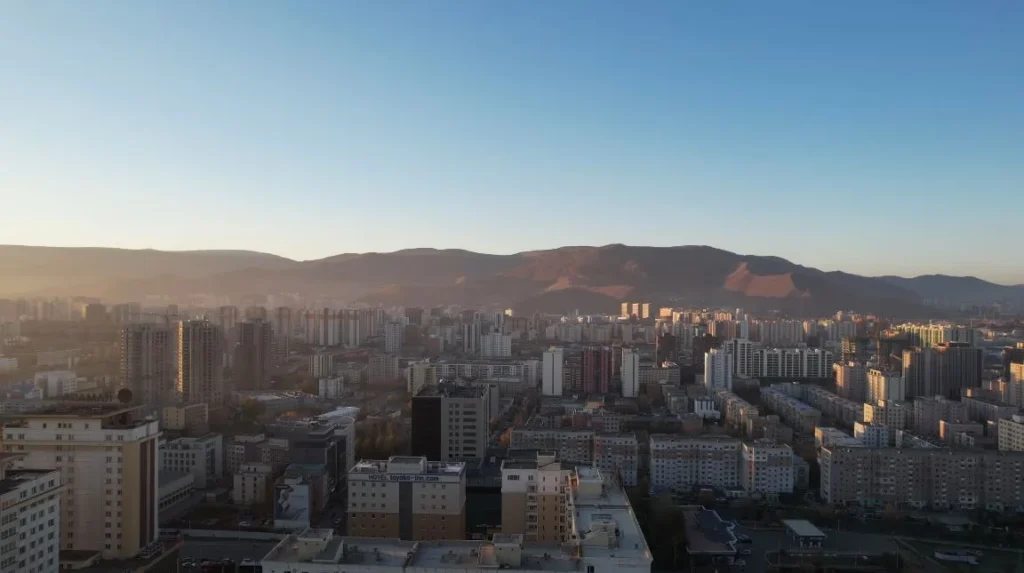
The hostel owner, Batbayar (everyone’s named Batbayar or Boldbaatar, I swear), looked at my booking and said something that became the theme of my trip: “You came… alone? In October?“
October in Mongolia. When it’s not quite winter but definitely not NOT winter. When the tourist season’s dead and the locals are stockpiling vodka for the cold months. Perfect time for a solo female traveler who doesn’t speak Mongolian, Russian, or even functional Mandarin.
What could go wrong?
The UB Nobody Instagrammed
Day two. Tried to find Gandan Monastery. Walked into three apartment courtyards, one police station and what I’m pretty sure was someone’s wedding before finally spotting the golden roofs.
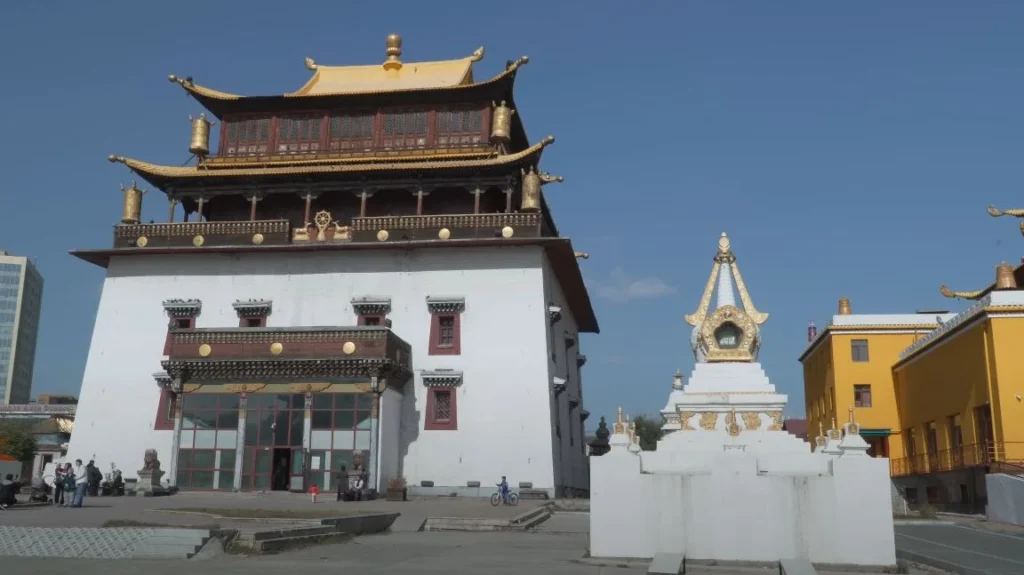
The monastery was the first place that made sense. Not because I understood the Buddhism—Mongolian Buddhism is its own beast mixing Tibetan traditions with shamanism and something else I never figured out. But the rhythm of it. Elderly ladies spinning prayer wheels. Monks in robes checking smartphones. Pigeons that own the courtyard and know it.
Met an old woman feeding the pigeons. She grabbed my hand, put bread in it and pointed at the birds. We sat there for an hour. She talked nonstop in Mongolian. I nodded and said “za za” (yeah yeah) which was literally the only phrase I knew. She patted my cheek when she left. I still don’t know what we talked about but it felt important.
The real UB revealed itself in pieces:
- Korean restaurants EVERYWHERE (Mongolia’s basically Korea’s Canada now).
- Irish pubs full of mining engineers drinking away their isolation pay.
- Night clubs in basements that don’t open until 2 AM.
- Soviet-era department stores selling both cashmere and bootleg Adidas.
- Coffee shops that charge $7 for instant coffee because actual coffee is imported luxury.
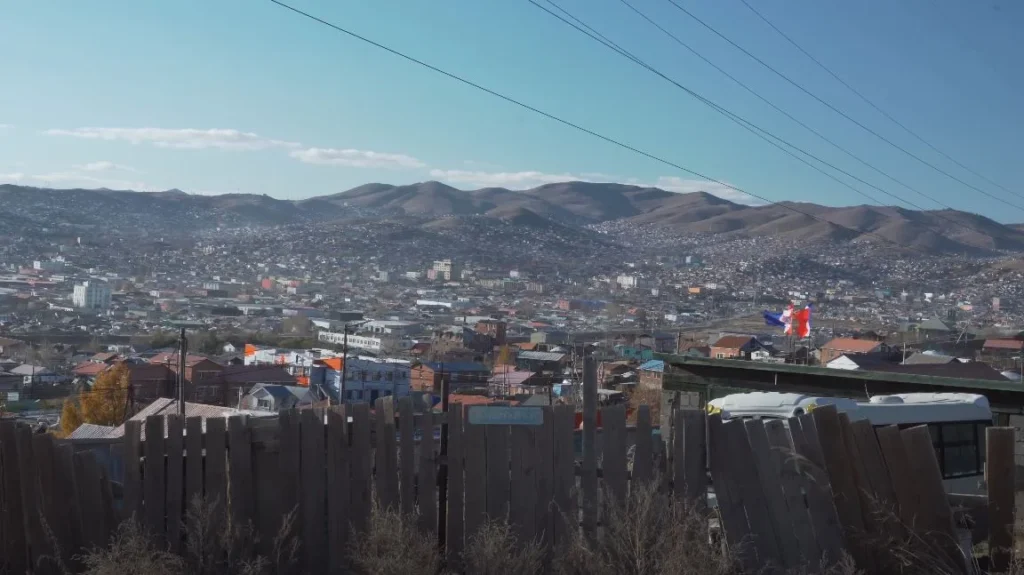
But then you climb any hill and see the ger districts. Half the city living in traditional felt tents with satellite dishes. No running water. No sewage. Just coal stoves that turn winter air into toxic soup. This is where the real Mongolians live while the city center pretends to be Seoul.
Walking through the ger district alone? Yeah, don’t. Learned that when three dogs the size of bears decided I looked suspicious. Their owner called them off, laughing. “Tourist?“ he asked in English. “Stupid tourist,” I corrected. He laughed harder, invited me in for tea.
The Road to Nowhere
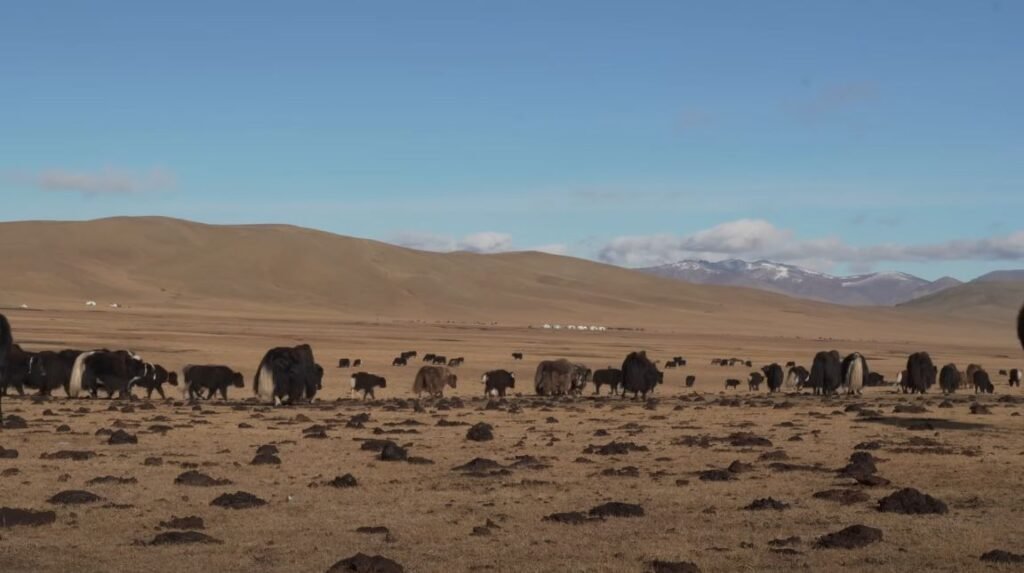
Hired a driver to escape UB. That’s what you do. You can’t rent a car because the roads aren’t roads, they’re suggestions. Sometimes they’re rivers. Sometimes they disappear entirely and your driver just… knows. Somehow.
My driver, Ganzorig, picked me up in a Russian van held together by wire and optimism. No seatbelts. One working headlight. A crack in the windshield shaped like Mongolia itself (I took this as a sign). He spoke twelve words of English. I spoke five words of Mongolian.
Perfect. Let’s drive into the void.
First hour out of UB: paved road! Second hour: dirt road! Third hour: is this even a road? Fourth hour: definitely not a road.
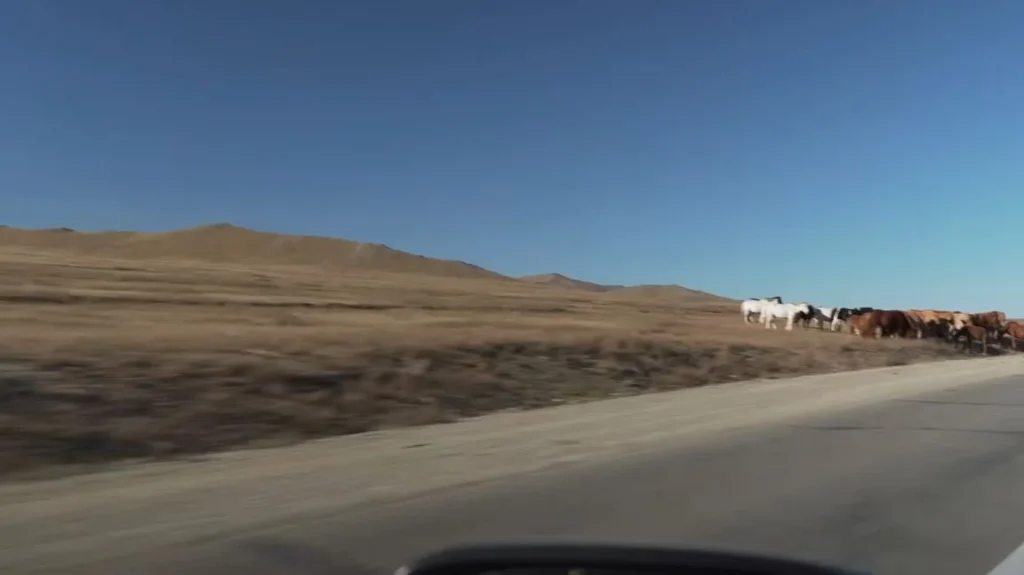
We stopped because horses. Not for horses. Because horses. They were the road now. Ganzorig lit a cigarette, turned off the engine. “We wait,” he said. The horses took forty minutes to decide to move. This is Mongolia. The animals have right of way because they were here first and they know it.
What Google Maps Doesn’t Tell You
| What Maps Show | Reality |
| Roads | Dirt tracks that become rivers after rain |
| 4 hour journey | 8-12 hours depending on yak traffic |
| Gas stations | Some guy with jerry cans in his yard |
| Towns | Three gers and a scary outhouse |
| Bridges | HAHAHA good luck with that river |
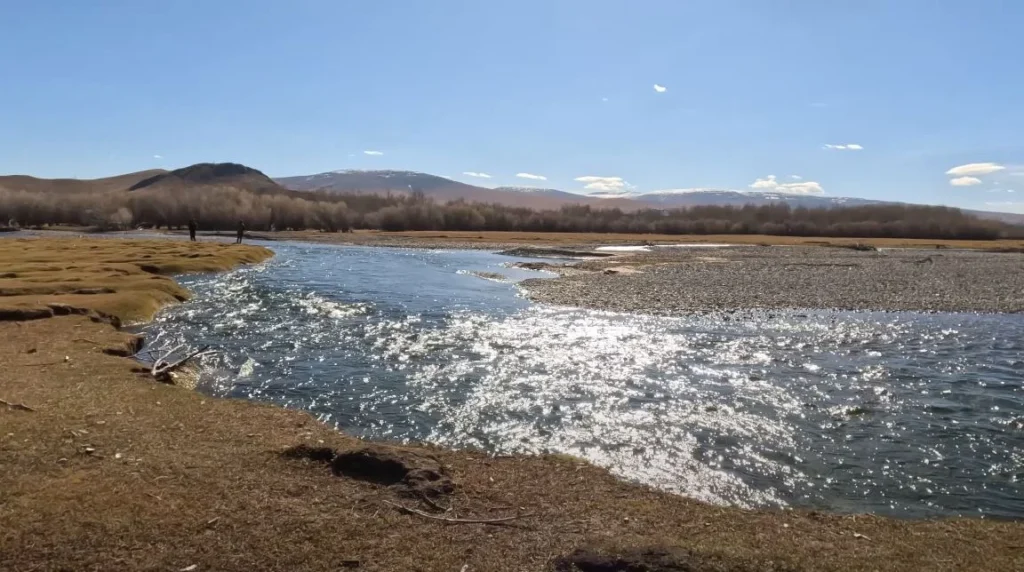
That river in the photo? We drove through it. Not over. Through. Ganzorig revved the engine, yelled something that was definitely a prayer or a curse and sent it. Water came through the doors. My backpack floated. I accepted death. Then we were on the other side and Ganzorig was laughing like this was normal Tuesday stuff.
“Many rivers,” he said, holding up fingers. “Seven? Eight?“
I wanted to cry.
Living Like Nomads
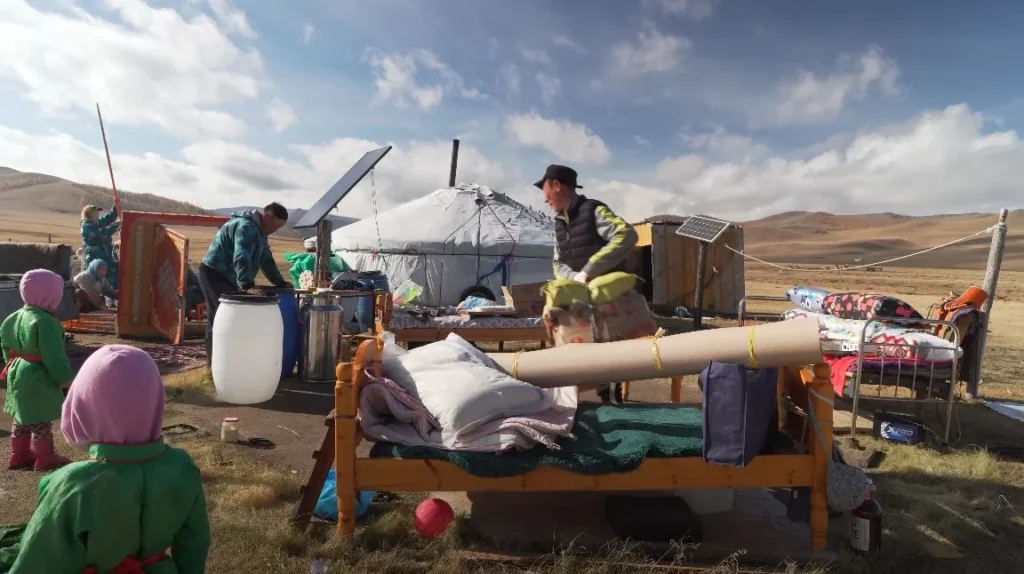
Found a nomad family willing to let me stay. Or rather, Ganzorig found them, explained my situation (foreign woman, alone, possibly insane) and they looked at me like I was a lost puppy. Which, honestly, accurate.
The grandmother, maybe 70, maybe 170, ran that ger camp like the navy. Five sons, their wives, approximately thirty thousand children and more animals than I could count. Plus me, the random tourist who couldn’t even milk a goat properly.
First lesson: everything in a ger has rules.
- Don’t step on the threshold (bad luck).
- Don’t point your feet at the altar (disrespectful).
- Don’t refuse food (extremely rude).
- Don’t touch the center poles (they hold up the universe, apparently).
I broke every rule within six hours. They kept feeding me anyway.
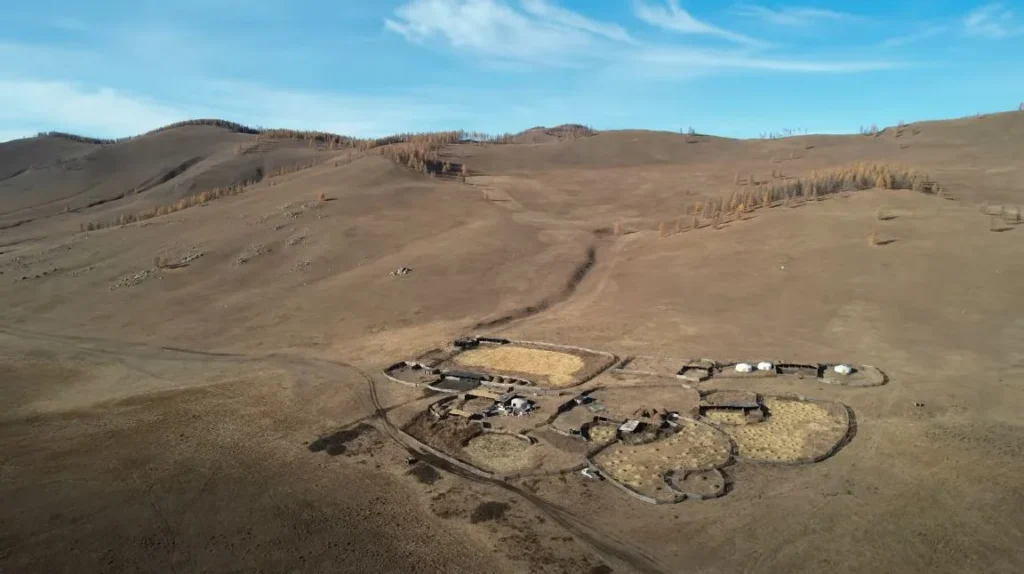
Morning routine started at 5 AM. Not by choice. The animals don’t care that you’re not a morning person. Grandmother handed me a bucket, pointed at the goats. I’d seen YouTube videos. How hard could it be?
Forty-five minutes later, I had half a cup of milk and a goat that hated me personally. The five-year-old took the bucket, filled it in three minutes, patted my hand sympathetically. The grandmother made me tea with vodka. At 6 AM. “Strong,” she said in Russian, pointing at me, then the goat. I think she meant I needed to be stronger. Or maybe she meant the goat was strong. Communication was art, not science.
Daily Nomad Schedule That Almost Killed Me:
5:00 AM – Animals wake up angry.
5:30 AM – Milk things that don’t want to be milked.
6:00 AM – Tea with fermented mare’s milk (yes, it’s alcoholic).
7:00 AM – Move animals to different grass.
8:00 AM – Breakfast (mutton).
10:00 AM – Check on animals.
12:00 PM – Lunch (mutton).
2:00 PM – Fix something broken.
4:00 PM – Herd animals back.
6:00 PM – Dinner (surprise! mutton).
8:00 PM – Vodka and stories I don’t understand.
10:00 PM – Sleep while frozen.
The mutton situation needs addressing. It’s not that I dislike sheep. It’s that after two weeks, I started having dreams where I WAS a sheep. Every meal: mutton. Boiled. With fat. The fat is the important part, they kept telling me. Calories for winter. I smiled and chewed and wondered if vegetarians just die here.
When Everything Goes Wrong in the Middle of Nowhere
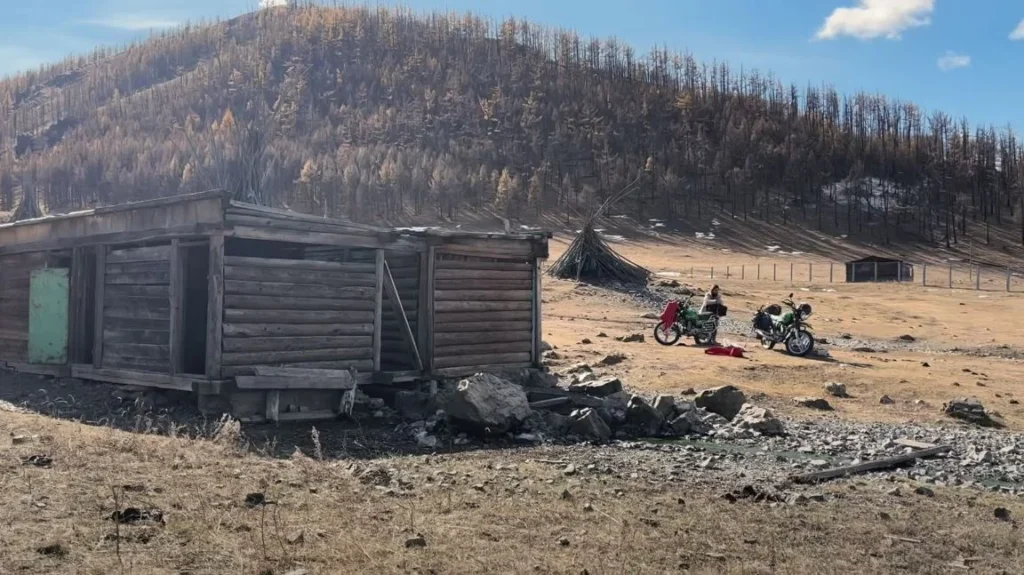
Left the nomad family to explore. Bad idea #247 of this trip. Hitched a ride with two guys on motorcycles heading to who knows where. They had an extra bike. I said I could ride.
I could not ride. Not on those roads. Not roads—suggestions of roads. Prophecies of where roads might exist someday.
Crashed within two hours. Not badly, just enough to scrape everything and bruise my entire left side. The guys were more concerned about the bike than me, which, fair—bikes are expensive here. We camped in what used to be forest before wildfire turned it into the set of a dystopian movie.
They left me the next morning. Just… left. Took their bikes and went. Left me a can of beef, two liters of water and pointed which direction to walk. “Town,” they said. “Maybe 20 kilometer.”
It was not 20 kilometers.
Things That Happen When You’re Alone in Mongolia:
- You realize how loud silence is.
- You start talking to birds (they don’t answer).
- You ration water until you’re dizzy then drink it all anyway.
- You wonder if anyone would even find your body.
- You see a car after 6 hours and cry actual tears.
- The car doesn’t stop.
- You keep walking.
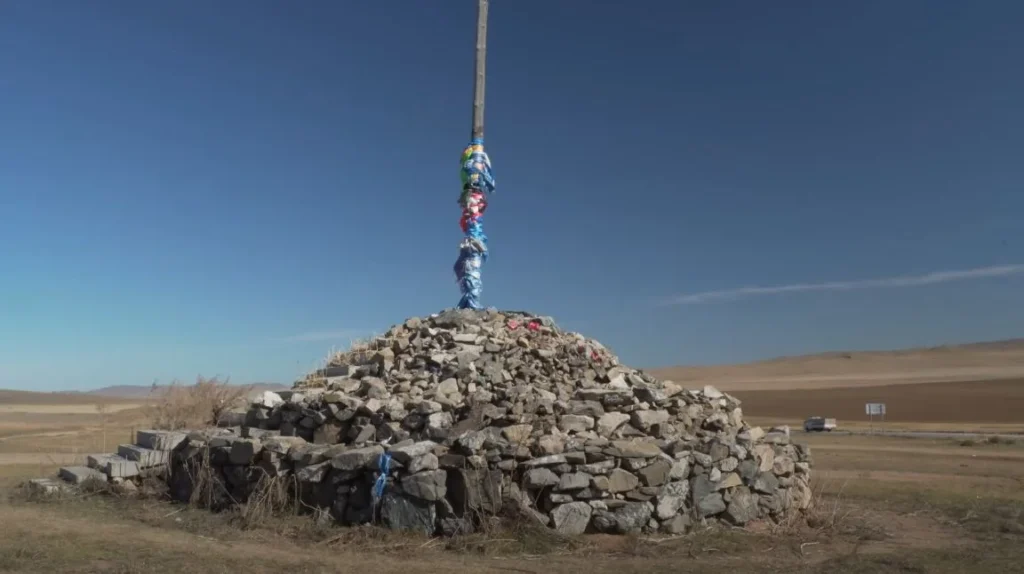
Found an ovoo around hour eight. These are everywhere—sacred cairns where travelers add stones, leave offerings, walk clockwise three times for safe journey. I added my stone. Walked my three circles. Left my last protein bar as offering. Pretty sure that’s not traditional but the spirits would understand.
Two hours later, a truck. The driver was delivering solar panels to somewhere even more nowhere. He laughed when I told him where I’d been walking from. “Wrong way,” he said. I’d been walking deeper into nothing. He U-turned, drove three hours back to something resembling civilization. Charged me nothing. Fed me bread and airag (fermented mare’s milk). Dropped me at a bus station that was just a bench and a sign.
The Monastery Circuit (Nobody Spoke English But Everyone Fed Me)
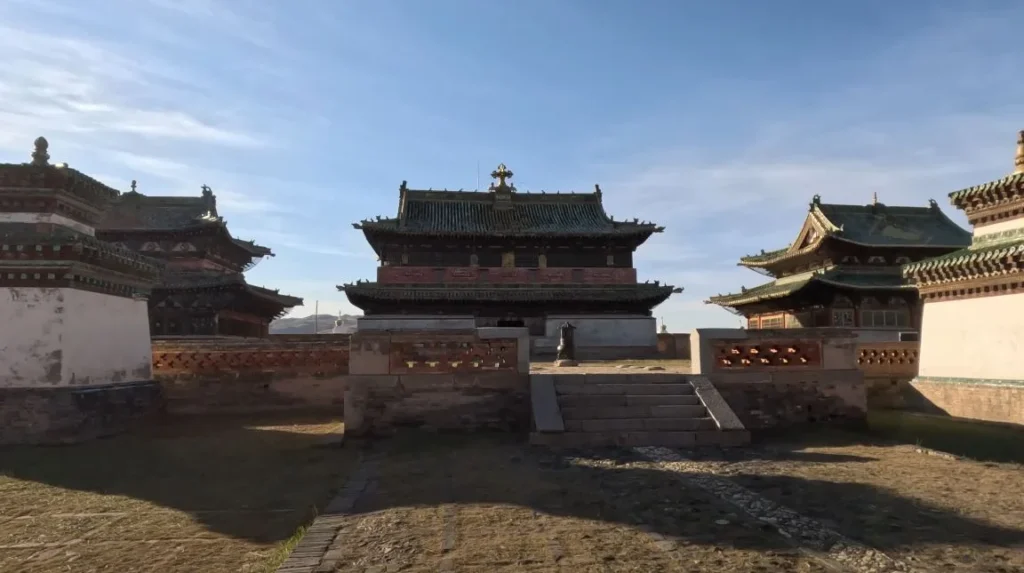
Made it to Kharkhorin. Ancient capital of the Mongol Empire. Now it’s a dusty town with one ATM that doesn’t work and a monastery built from the ruins of Genghis Khan’s capital. Poetic or depressing, depending on your mood.
Erdene Zuu Monastery. Surrounded by 108 stupas because 108 is sacred in Buddhism and also because why not. I counted. It’s actually 107. Nobody else seemed bothered by this.
The monks here were different from UB. Quieter. Older. One saw me sitting alone, eating bread from my backpack like the saddest picnic ever and brought me inside. Not the tourist inside. The real inside where they eat.
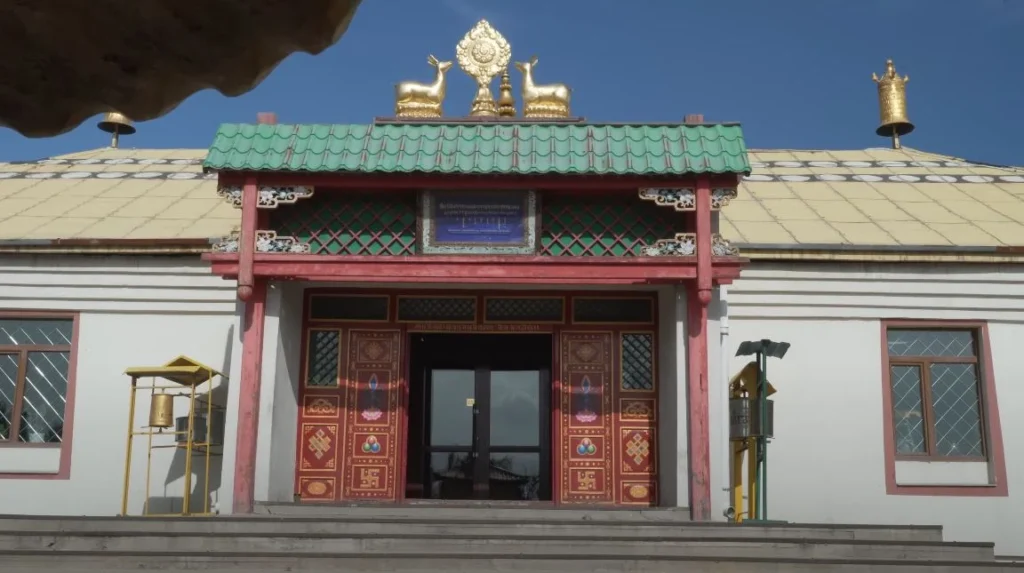
Lunch was rice, pickled vegetables and milk tea with salt. SALT. In tea. I’d been warned about this but nothing prepares you for salty tea when your brain expects sweet. The monk watching me saw my face, laughed so hard he choked. Then he made me more tea. With extra salt. Monks have a sense of humor, turns out.
They let me sleep in the temple guest room. “Guest room” being generous. It was a storage closet with a mattress that smelled like yak butter and incense. The head monk spoke maybe ten words of English but drew me a map to the “turtle rock” the next morning. The map was… abstract. A circle, some lines, what might have been a horse or a cloud.
Found the turtle rock after four hours of walking in what was definitely the wrong direction. It looked nothing like a turtle. More like a potato. A sacred potato, apparently. Three Korean tourists were there taking eight million photos. They had a driver, a guide, a cooler full of snacks. Looked at me—dusty, alone, eating stale bread—like I was part of it too. Gave me kimchi out of pity.
Buddhist Sites vs Reality:
What guidebooks say: Ancient spiritual centers of contemplation. Reality: Half restored for tourists, half falling apart, monks on smartphones.
What guidebooks say: Peaceful meditation spaces. Reality: Chinese tour groups with megaphones at 7 AM.
What guidebooks say: Traditional Buddhist ceremonies daily. Reality: One monk chanting while checking football scores.
What guidebooks say: Vegetarian meals available. Reality: Mutton. Always mutton. Buddhism didn’t change the mutton situation.
Getting Adopted by Drunk Uncles in the Gobi
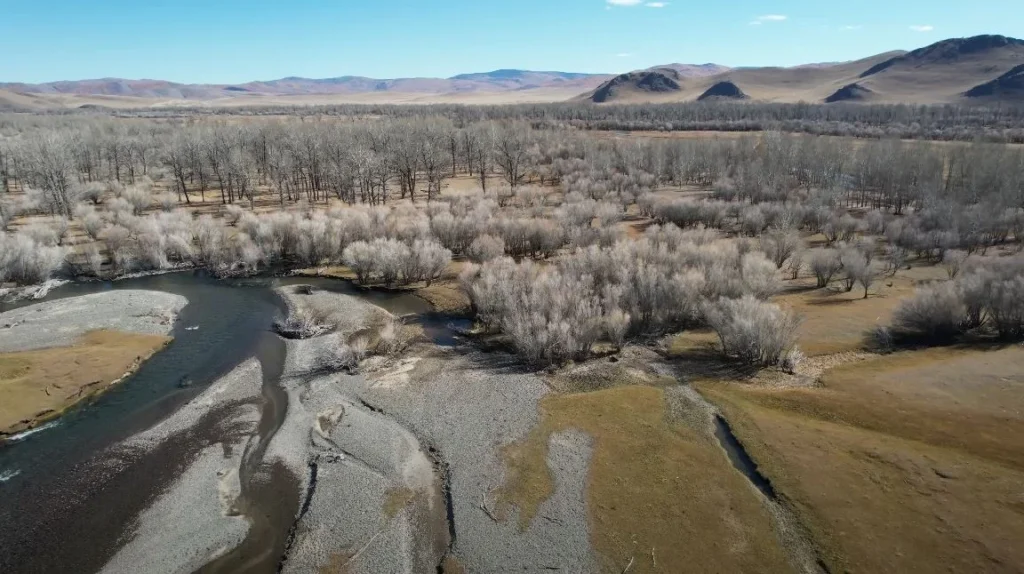
The bus to the Gobi edge broke down six times. This was normal, apparently. Everyone just got out, smoked, peed on the side of the road (yes, everyone), waited for the driver to hit things with a wrench until the bus started again.
A man named Tsogt (I think) decided I needed protecting. He was about 60, drunk at 11 AM and had opinions about everything. Mostly that I was too skinny and traveling alone would get me killed. He shared his airag. Then his arkhi (Mongolian milk vodka). Then his entire life story which I understood zero percent of but nodded along anyway.
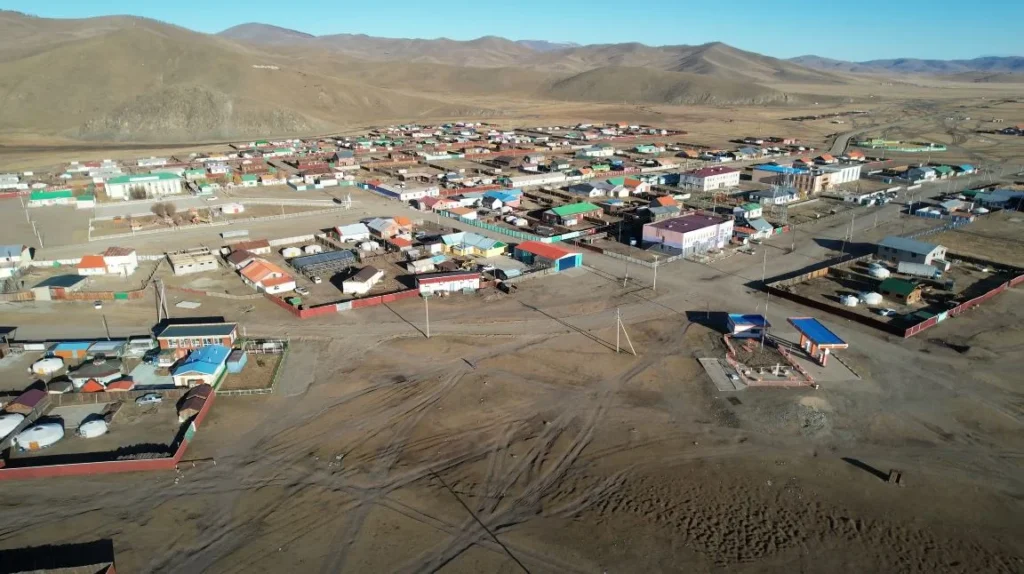
We stopped at his brother’s ger in the middle of actual nowhere. The kind of nowhere where the next neighbor is 30 kilometers away. His brother had MORE arkhi. His brother’s wife had mutton. Of course. They decided I was staying the night. Not asked. Decided.
The family dynamics were insane:
- Uncle 1: Drunk, philosophical, kept pointing at stars and saying “Genghis Khan”.
- Uncle 2: Less drunk, angry about wolf that killed his goat last week.
- Wife: Sober, running everything, occasionally smacking both uncles.
- Teenage daughter: Embarrassed by everything, on her phone somehow getting signal.
- Grandmother: Ancient, might have been dead, nobody was sure.
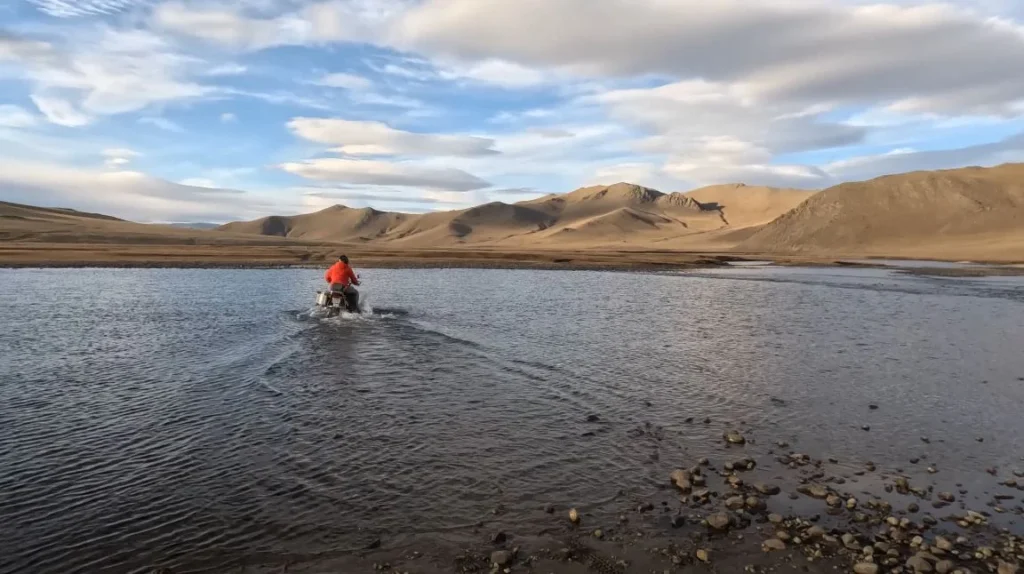
They had one motorcycle between them. Five people. One motorcycle. The teenager drove it to school—45 kilometers each way. The uncles used it for supply runs. The wife used it to visit her sister. Grandmother used to ride it until last year when she “got tired.” She was 89.
The teenage daughter spoke a bit of English from Korean dramas. “You’re weird,” she told me. “Why come here? Nothing here.” I tried to explain wanting to see the real Mongolia. She laughed. “This isn’t real Mongolia. Real Mongolia has wifi.”
She wasn’t wrong.
Lost in the Gobi
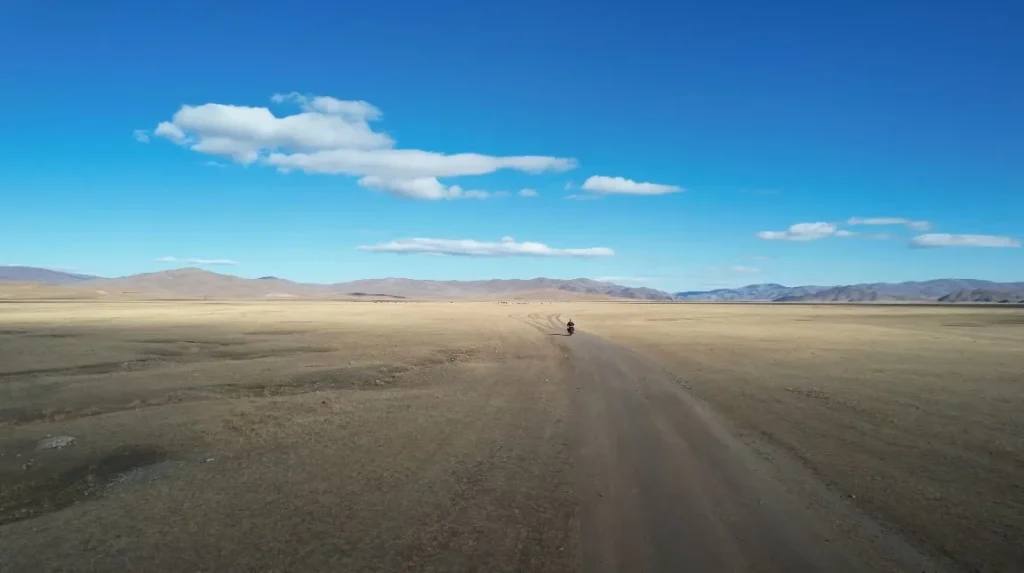
Left the drunk uncles, caught a ride with a mining truck heading south. The driver dropped me in what he swore was a town. It was four buildings and a well. The “hotel” was one room above a shop that sold instant noodles, vodka and disappointment.
The shop owner, a woman who’d clearly seen some things, looked at my plan to hitchhike further into the Gobi and just said, “Why?“ Good question. I didn’t have an answer that made sense even to me.
Waited three days for a ride. THREE DAYS. In those three days, I:
- Ate seventeen packets of instant noodles.
- Learned to play cards with local miners who laughed every time I lost.
- Watched the same Mongolian drama on repeat (the shop had one DVD).
- Contemplated all my life choices.
- Decided I’d made mostly bad ones.
- Ate more noodles.
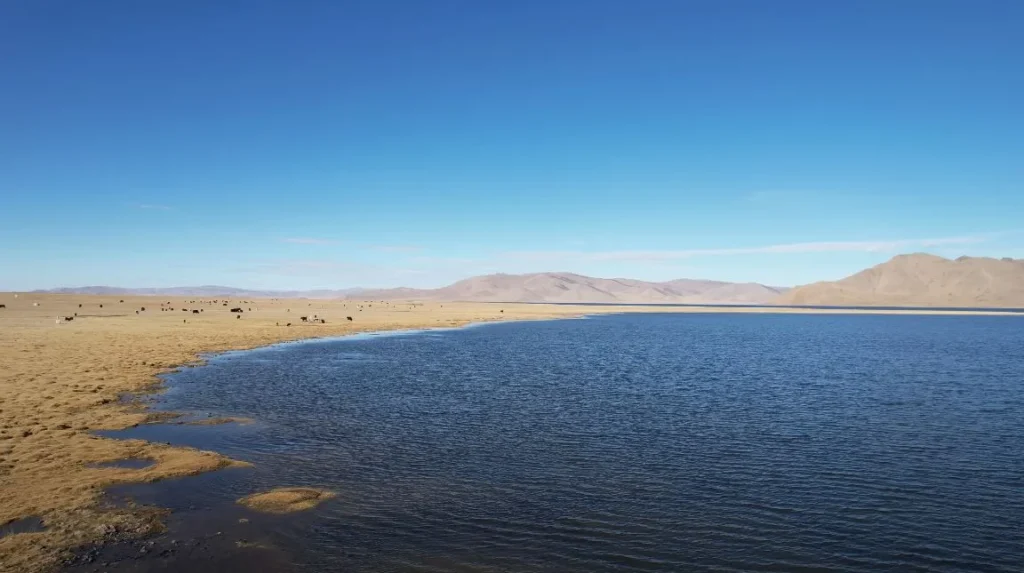
Finally, a family heading to their winter camp took pity on me. Packed into their truck with approximately everything they owned, including two very angry chickens. The chickens hated me specifically. Six hours of being pecked while the family sang songs and shared dried cheese that tasted like salty rubber.
They dropped me at an actual town. With actual buildings. And an actual guesthouse run by a woman who’d lived in Poland for ten years and spoke beautiful English. “You look terrible,” she said. “When did you last shower?“
Eight days. It had been eight days.
She charged me triple for hot water. I paid happily.
Gobi Survival Kit Nobody Tells You About:
- Wet wipes (shower substitute for a week).
- Instant noodles (every flavor tastes the same after day 3).
- Vodka (currency, gift, antiseptic, bad decision juice).
- Toilet paper (BRING YOUR OWN OH GOD).
- Power bank (charged maybe once a week if lucky).
- Snickers bars (literal gold in the desert).
- Photos of your family (conversation starter when language fails).
- Dignity (leave at home, you won’t need it).
When Your GPS Laughs at You
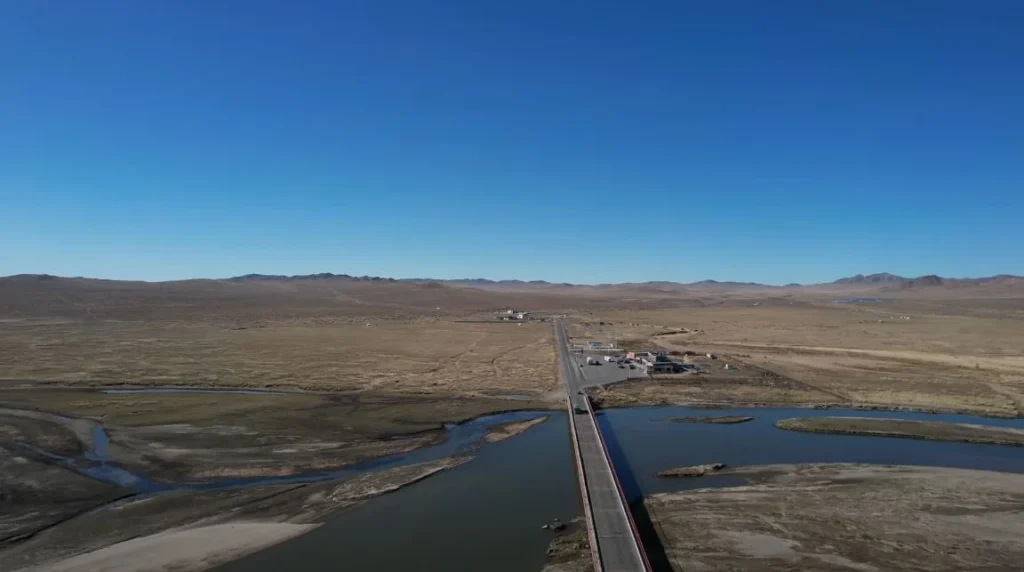
That bridge? The only one for 200 kilometers in any direction. If you miss it, you’re adding a day to your journey. My driver knew this. The motorcycle with the flat tire blocking the bridge knew this. Everyone knew this.
We waited four hours for someone with tools to show up. During that time, I met:
- A Russian botanist studying desert plants (alone, obviously).
- Korean missionaries who tried to save my soul (politely declined).
- A Mongolian family moving their entire life in one truck.
- An old man transporting a single goat for reasons never explained.
The universal reaction to me: “Alone? But you’re a woman.” Yes, thanks, I’d noticed.
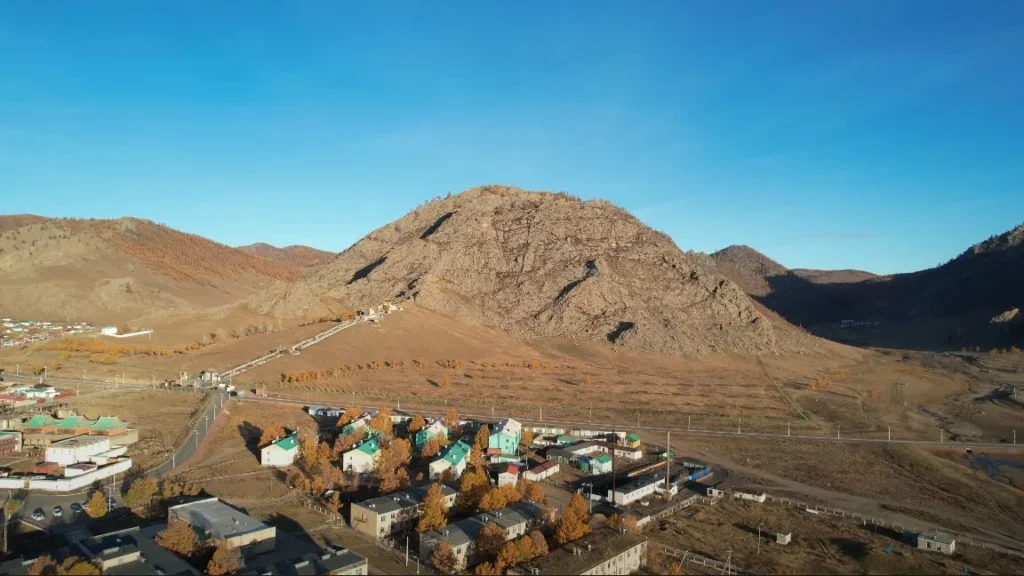
Made it to this valley town just as autumn hit properly. By “town” I mean a cluster of houses where everyone knows everyone and I stood out like a neon sign. The guesthouse owner’s son appointed himself my guide. He was twelve, spoke English from YouTube and had strong opinions about my life choices.
“Why you come Mongolia?“ he asked. “Adventure,” I said. “This not adventure. This boring. You want adventure? Go Seoul. They have VR cafes.”
He wasn’t wrong but I wasn’t admitting that to a twelve-year-old.
The Night Everything Made Sense
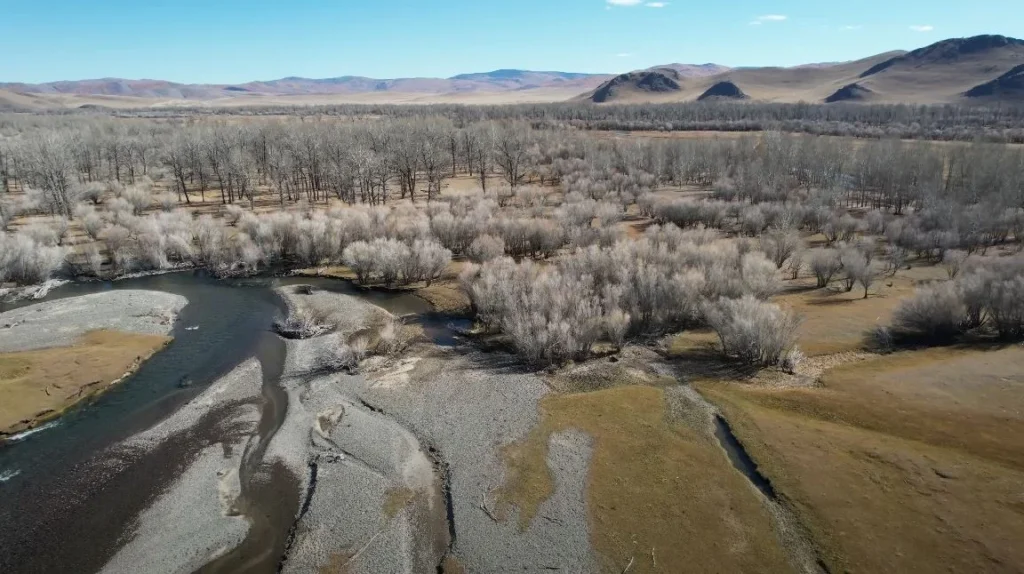
My last week. Somewhere near the Russian border where October means winter and the trees looked like ghosts. Hitched a ride with a truck driver who didn’t speak any language I knew but played Elvis on repeat for eight hours. EIGHT HOURS OF ELVIS.
He dropped me at a ger camp that wasn’t really a camp, just a family who sometimes took in travelers. The grandmother (why is it always grandmothers running things?) had hands like leather and a smile that suggested she’d seen every kind of stupid tourist and I was just another Tuesday.
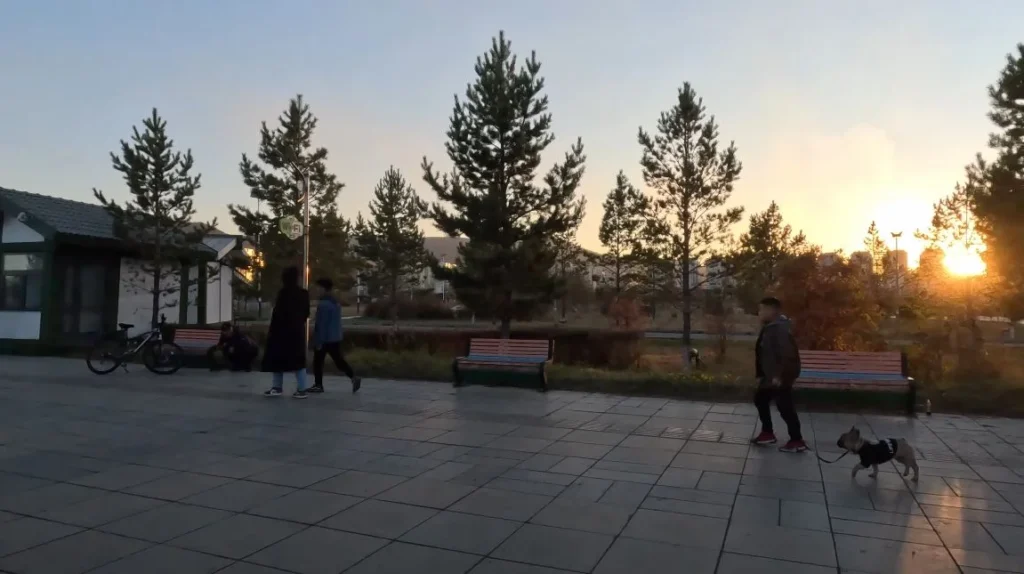
Her grandson, maybe 25, worked in UB but was visiting. He’d studied in China, spoke Mandarin, Mongolian, Russian and enough English to actually have a conversation. First real conversation in weeks where I wasn’t just nodding and hoping I hadn’t agreed to buy a camel.
“Why do foreigners come here?“ he asked. We were sitting outside, watching the stars—more stars than I knew existed.
“Looking for something,” I said.
“Did you find it?“
I thought about the drunk uncles, the abandoned motorcycle, the seventeen packets of instant noodles, the mutton nightmares, the kindness of strangers who owed me nothing.
“I found something,” I said. “Not sure what yet.”
He laughed. “That’s Mongolia. You never find what you’re looking for. You find what you need.”
Deep, right? Until his grandmother yelled at us to come help milk the yaks and I remembered I still couldn’t milk anything properly.
The Buddhist Temples Where I Pretended to Understand Enlightenment
Back in UB for my last few days. Figured I should see the famous sites properly before leaving. Gandan Monastery again, but this time with a hangover from farewell arkhi with the guesthouse family. Bad idea. Buddhist chanting plus milk vodka aftermath equals existential crisis.
A young monk, maybe 19, saw me sitting on the steps looking like death. He brought water and some kind of bread that tasted like cardboard but saved my life. We “talked“ using my phrasebook and his three words of English. He was from the countryside, studying in UB, missed his family’s animals. I showed him photos from my phone—all the nowhere places I’d been. He knew half of them. His village was near one of my nowhere stops.
“You saw real Mongolia,” he said, using his phone to translate. “Tourists see temples. You saw life.”
Yeah, I saw life. Life kicked my ass.
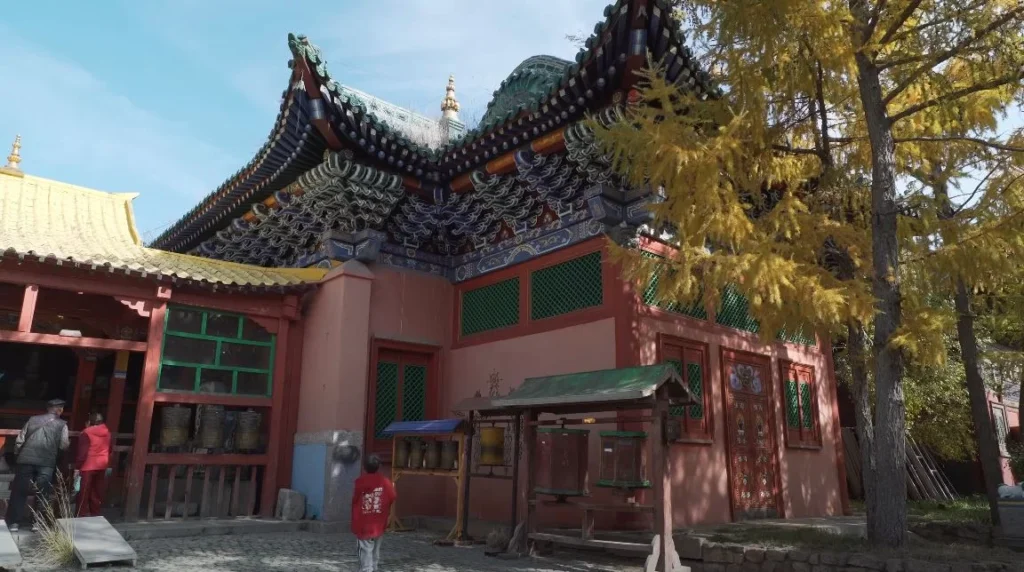
This temple was my last stop. More Chinese than Mongolian, built during the Qing dynasty when Mongolia was basically China’s backyard. The ginkgo trees were golden, the only beautiful thing I’d seen in UB that wasn’t trying to sell me cashmere.
An old man was feeding pigeons. Different man, same pigeons, same ritual as my first week. He saw me watching and patted the bench. We sat there until sunset. He pulled out a thermos—tea with salt, of course—and shared it. My last salty tea in Mongolia. I almost liked it. Stockholm syndrome for beverages.
The Horse Incident Nobody Needs to Know About
Three days before flying out. Decided I needed to ride a Mongolian horse properly. Not the tourist horses. Real ones. Found a family outside UB who laughed when I explained what I wanted but agreed for $20.
Their horses weren’t like the gentle things at riding schools back home. These horses were half-wild, treated cars as suggestions and definitely plotted murder. Mine was called something that translated to “Lightning” which should have been a warning.
Lightning decided he didn’t like me before I even got on. Tried to bite me. Stepped on my foot (deliberately, I swear). When I finally mounted, he stood completely still for thirty seconds, then took off like someone fired a gun.
How to Not Die on a Mongolian Horse:
- Hold on (obvious but harder than it sounds).
- Lean forward (or backward? I couldn’t tell while screaming).
- Pull reins (horse laughs at your attempts).
- Accept fate (most realistic option).
- Fall off (inevitable).
- Lie in dirt contemplating life choices (mandatory).
I lasted maybe three minutes before eating dirt. The family’s five-year-old rode the same horse right after, bareback, while eating an apple. The horse turned into a lamb for her. Horses know. They can smell fear and incompetence.
The father took pity, put me on their oldest horse. This one was basically dead, moved at the speed of continental drift, perfect for my wounded pride. We “rode” (walked very slowly) to a viewpoint where you could see UB’s smog cloud in the distance. He pointed at the city, then at the steppes, then at me and said something long in Mongolian. His son translated: “He says you’re stupid for coming here alone but brave. Stupid but brave. This is good combination for life.”
Thanks, I think?
The Market Where Dreams Go to Die
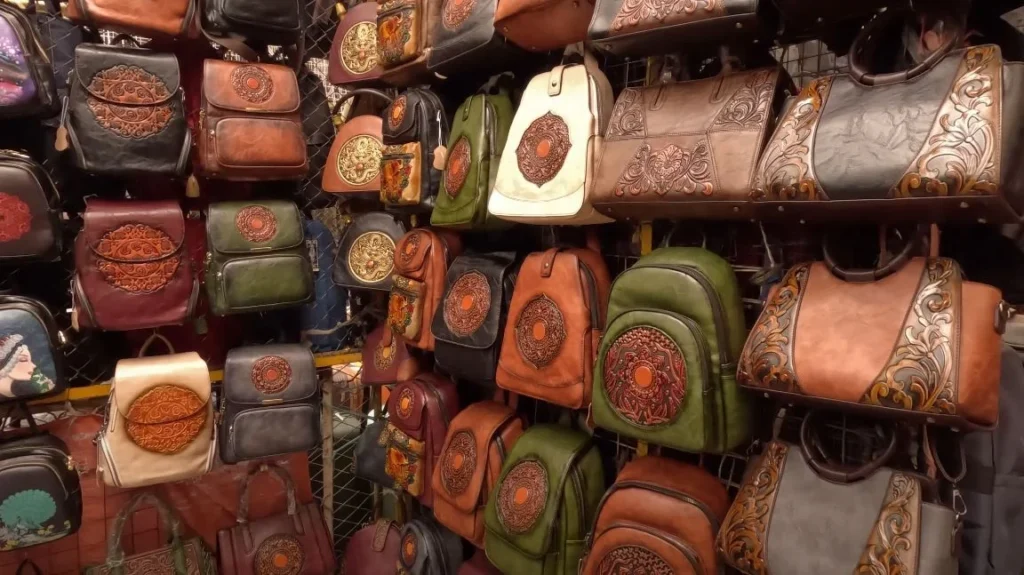
Naran Tuul, the Black Market. Not actually black market anymore, just regular market, but the name stuck. If you want to buy anything from a sheep’s head to Soviet medals to definitely-not-stolen phones, this is your place. Went to buy gifts, left with trauma and a camel wool blanket that smells like wet dog.
The leather bags in that photo? Every tourist buys one. They’re “traditional” made in China, cost three times what locals pay and fall apart after a month. I bought two. The seller saw me coming from space.
Got lost in the food section. Mistake. Saw things that shouldn’t exist. A sheep’s head smiling at me. Pickled things in jars that might have been vegetables or organs. An entire row of dried milk products that could survive nuclear winter. The smell… imagine if cheese died, was buried, dug up and died again.
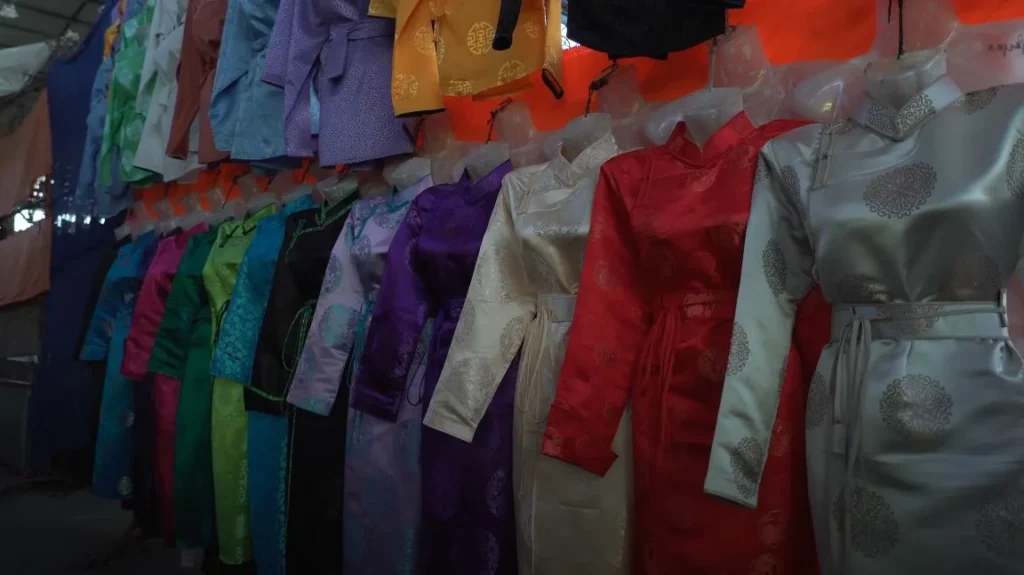
The deel section was different. These are traditional robes, absolutely gorgeous, cost more than my flight. An old woman selling them made me try one on. Silk, hand-embroidered, the kind worn for Tsagaan Sar (New Year). I looked ridiculous—like a tourist playing dress-up, which I was. She laughed, adjusted it properly, made me take a photo. Then tried to sell it to me for $400.
“Traditional price,” she said with a straight face. “I’m not traditional,” I said. “Then $300.”
I did not buy the deel.
Black Market Survival Guide:
| What They’re Selling | What It Actually Is |
| “Cashmere” | Sheep wool with dreams |
| “Antique” | Made last week, aged with tea |
| “Traditional medicine” | Don’t ask, definitely don’t consume |
| “iPhone” | ¡Phone with suspicious origins |
| “Genuine leather” | Genuine something |
| “Fresh meat” | Fresh is relative |
The Last Supper
My last night, the hostel crew threw a “party.” Five backpackers who looked as shell-shocked as me, Batbayar the owner, his wife who cooked everything and enough arkhi to kill a yak.
We had:
- German guy who’d bicycled from Berlin (certifiably insane).
- Japanese couple who’d taken the Trans-Siberian and regretted everything.
- French girl studying shamanism who kept burning sage.
- British guy who was definitely running from something.
- Me, who’d survived three weeks of solo Mongolian chaos.
The German guy had the best/worst stories. Attacked by eagles. Twice. Bike stolen then returned by police who were the thieves. Food poisoning in five different provinces. Still planning to bicycle to Beijing. We voted him most likely to die but too stubborn to notice.
Batbayar made a toast: “To foreigners stupid enough to come Mongolia alone in October!” We drank. The arkhi tasted like paint thinner mixed with milk. We drank more. The French girl pulled out a guitar. We sang Wonderwall badly in four languages. The neighbors complained. We sang louder.
At 3 AM, sitting on the hostel’s roof watching UB’s lights flicker (power cuts, always power cuts), the British guy asked, “Would you do it again?“
I thought about everything. The fear in that first taxi ride. The grandmother who fed me when I couldn’t communicate. The motorcycle crash. The drunk uncles. The seventeen packets of instant noodles. Lightning the demon horse. The kindness of strangers who gained nothing from helping me. The loneliness so complete it became its own companion. The mutton. Dear god, the mutton.
“Yeah,” I said. “But with more wet wipes.”
Leaving Mongolia
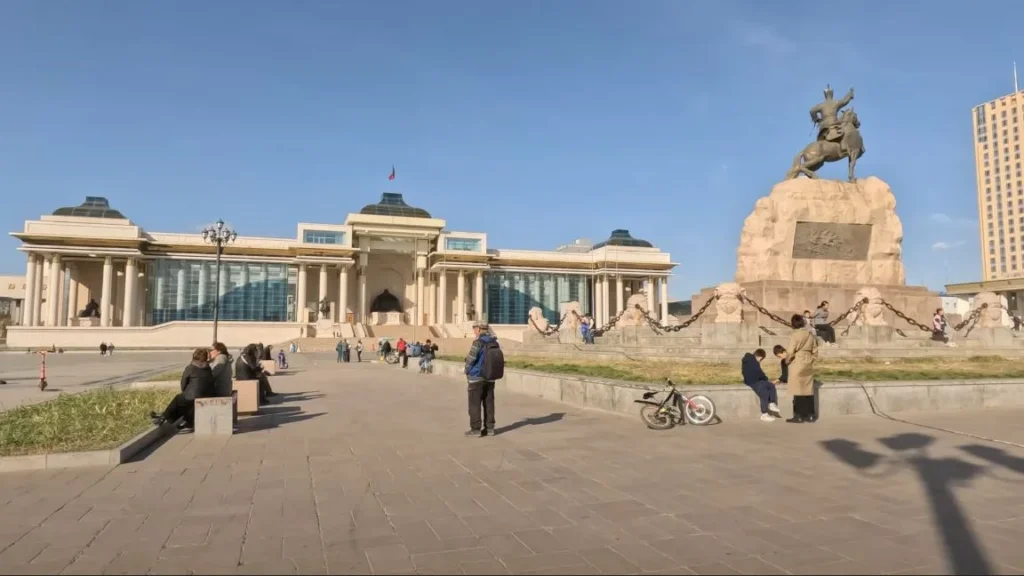
Last morning. Walked to Sükhbaatar Square at sunrise. The statue looked different—less imposing, more like a grandfather watching his weird grandkids figure life out. The city was quiet. Even the dogs were still sleeping.
An old woman was doing tai chi. The same one from my first week? Different one? They all looked like grandmothers who could survive anything. She saw me with my backpack, clearly leaving and said something in Mongolian. Then, in perfect English: “It gets easier.”
“What does?“
“Everything. After Mongolia, everything easier.”
She wasn’t wrong.
The taxi to the airport drove past the ger districts, the Soviet blocks, the random luxury hotels nobody stays in, the hills I’d climbed to see the city sprawl. The driver, chattier than most, asked where I was from, where I was going.
“Home,” I said.
“Mongolia is home now too,” he said. “You leave, but Mongolia stays in you. Like infection. But good infection.”
He wasn’t wrong either.
At the airport, my backpack smelled like yak, mutton and regret. Security pulled me aside. The officer opened my bag, sniffed, made a face. Found my collection of rocks from various ovoos (definitely not supposed to take those), the camel wool blanket that triggered bio-hazard sensors and three bottles of arkhi I’d forgotten about.
“Tourist?“ he asked. “Survivor,” I said.
He laughed, confiscated the arkhi, let me keep the rocks. “For luck,” he said. “You need it.”
Final Mongolia Statistics:
- Days solo: 23
- Showers taken: 4
- Times genuinely thought I might die: 7
- Instant noodle packets consumed: 31
- Shots of arkhi survived: Lost count after 50
- Mongolian words learned: Maybe 20
- Mongolian words retained: 5
- Times asked “Alone?“: Every. Single. Day.
- Regrets: 0
- Lies told: 1 (that last one)
The plane lifted off and UB disappeared into its own smog. The businessman next to me glanced at my disaster appearance and moved seats. Fair. I smelled like I’d been living with yaks. Because I had been.
Opened my phone to write notes, found a message from the twelve-year-old guide kid: “You survived boring Mongolia! Now you can survive anything! Come back when we have wifi everywhere!”
Not sure about the wifi everywhere, kid. Some places are better broken. Some trips are better alone. Some stories need nobody else to understand them.
Mongolia didn’t change me. It just showed me I was already weird enough to spend three weeks alone in a place that doesn’t want visitors in October, eating mutton until I questioned reality, getting adopted by strangers who didn’t speak my language and somehow considering it the best terrible decision I’d ever made.
You don’t travel solo to Mongolia to find yourself. You go to lose yourself so completely that whatever comes back must be real. Even if what comes back smells like yak and can’t look at mutton without flashbacks.
Would I do it again?
Ask me after the nightmares stop.
